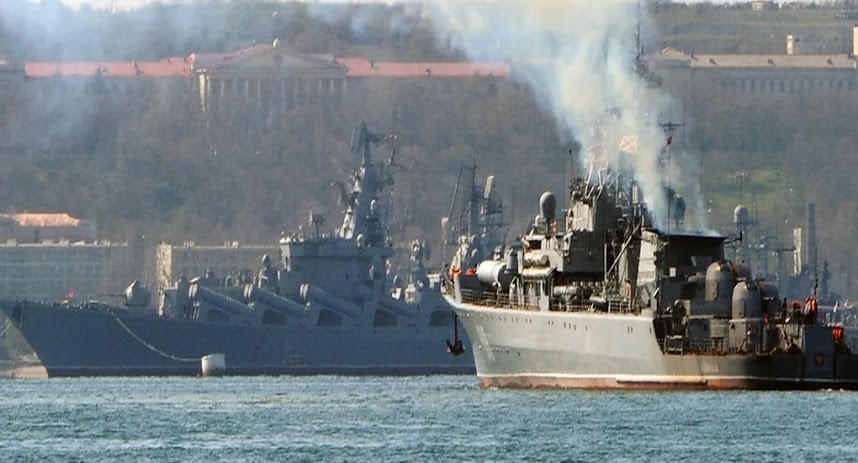 |
| The Russian navy patrol ship Pytliviy navigates nearer to the Russian Navy's flagship missile cruiser Moskva. Image Credit: Getty |
Ukraine has registered the Russian shipwreck of the Moskva as "underwater cultural heritage," a decision that has been criticized for "trolling" Moscow rather than being based on international law.
"The Russian fleet's flagship, the 'Moskva' missile cruiser earned number 2064 on Ukraine's registry of submerged cultural treasures," the country's defense ministry posted on Facebook. "It is possible to observe the legendary cruiser and the most sunken object at the bottom of the Black Sea."
The Moskva, the Russian navy's Black Sea flagship vessel, fell during a towing operation last week after a fire broke out on board. The Moskva is a 510-crew missile cruiser and a symbol of Russia's military supremacy. Ukraine said its troops were behind the attack and fired missiles that sank the ship, but Moscow claims the fire was caused by bursting weapons on board.
However, Ukraine's move is questionable legally.
According to "the UNESCO Convention," "all traces of human activity on the bottom of the Black Sea within our state's economic activity" are national property, according to the country's defense ministry.
This, according to Eden Sarid, a lecturer at the University of Essex and a cultural heritage law expert, is incorrect.
"Any site or any undersea object in their territorial waters can be registered as a cultural heritage site," he stated. "When international law comes into play, things get a little more difficult."
The UNESCO-led Underwater Cultural Heritage Convention, which was established in 2001 and has been signed by 71 nations, including Ukraine, governs underwater heritage internationally. Its goal is to protect "all evidence of human existence" found underwater, including as shipwrecks and sunken cities, and to establish a framework to resist unlawful looting.
According to Sarid, this categorization signifies that the site can only be accessible for research or recreation and that it cannot be recovered. However, he contended that the law does not apply to the Moskva in a number of ways.
For starters, any heritage site must be "partially" underwater "for at least 100 years," according to the convention. Second, the Moskva is a foreign vessel flying a foreign flag, making it impossible for Ukraine to claim it as its own national heritage. Finally, because Russia is not a signatory to the UNESCO agreement, it is not required to follow any of its guidelines.
"They're trollin' Russia," he explained. "This is part of the story Ukraine is writing... about how it opposed the Russian invasion — and when it's your cultural heritage, it becomes part of the story."
Nonetheless, Russia was the first to employ such a strategy against Ukraine.
In 2011, then-Prime Minister Vladimir Putin retrieved two ancient ceramic jars from the Taman Gulf, which is located near Crimea. Then, after Russia annexed the peninsula in 2014, Moscow used alleged archeological evidence of proto-Russian kings in the Crimean peninsula as part of broader arguments justifying the annexation on historical grounds.
Despite the fact that Russia is not a member of the convention, it presented UNESCO with a document citing the "protection of cultural heritage in Crimea" as one of the reasons for its move.
UNESCO declined to comment on the legality and implications of Ukraine's move.









0 Comments
please do not enter any spam link in the comment box